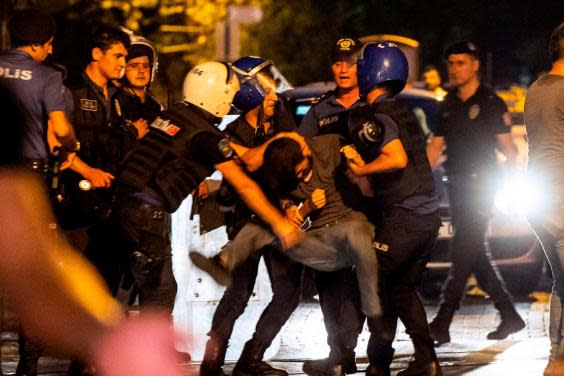Removal of Kurdish mayors prompts fears of wider crackdown on Turkey's opposition

Turkey’s interior minister warned the mayor of Istanbul and other critics to keep quiet about the removal of elected officials in the country’s Kurdish southeast, adding to concerns about a potential government clampdown on opposition mayors recently voted into power.
During a lengthy meeting with international journalists, Suleyman Soylu defended the Turkish government’s controversial decision to suspend three elected Kurdish mayors on Monday and replace them with appointees.
He described it as a legally justified step to counter the outlawed separatist Kurdistan Workers Party, or PKK, which is widely blacklisted as a terrorist organisation.
The move prompted widespread criticism, including from recently elected Istanbul opposition mayor Ekrem Imamoglu, who wrote on Twitter that “ignoring the will of the people is unacceptable.”
Scores were detained in protests following the suspensions, with police targeting demonstrators in Istanbul with rubber bullets and tear gas.
Asked by The Independent whether those officials voicing support for the ousted mayors could also be accused of sympathy for terrorist groups, Mr Soylu - whose interior ministry oversees municipal governments - dismissed their criticisms as political posturing.
“To what extent should mayors engage in political commentary?” he said.
“My advice to them is, they should mind their business and should not make ridiculous comments about things they don’t understand.”
The removal of the mayors comes just months after the election of Mr Imamoglu, who trounced a pro-government candidate in June after his narrow 31 March victory was annulled under pressure by President Recep Tayyip Erdogan, and has rattled Turkey’s political scene. Mr Imamoglu is seen as a star in Turkish opposition politics, and there is worry that Mr Erdogan will attempt to hamper his rise.
He and the opposition mayor of Ankara, the capital, ended 25 years of rule by Mr Erdogan’s party in the two cities.

Who can say the removal of the mayors is not also a threat to municipalities currently ruled by other opposition parties?” said a commentary Wednesday by Cigdem Toker in the daily newspaper Sozcu.
Even Ahmet Davutoglu and Abdullah Gul, former top officials and allies of Mr Erdogan as well as founding members of the reigning Justice and Development Party, criticised the suspensions as anti-democratic.
Mr Soylu’s team handed out dossiers detailing the alleged crimes Diyarbakir co-mayor Adnan Selcuk Mizrakli, Mardin mayor Ahmet Turk and Van co-mayor Bedia Ozgokce. All of them, members of the Kurdish-rooted People’s Democratic Party, had defeated government-appointed trustees in 31 March elections.
Mr Soylu likened the removal and prosecution of the elected officials to Spain’s moves against elected Basque and Catalan elected officials who became part of separatist movements.
“Although there is no violent act, 12 Catalan officials were prosecuted for crimes of destroying constitutional order through violence and disobedience,” he said.
Read more
Erdogan says people paying 'serious money' to bury Khashoggi murder
Istanbul election loss a ‘wake-up call’ for Erdogan’s ruling party
Does Imamoglu’s victory in Istanbul mean the end of Erdogan?
Opposition candidate in Istanbul election wins stunning victory
During a speech and a question-and-answer session with journalists that lasted three-and-a-half hours, Mr Soylu discussed Turkey’s anxieties about refugees and migrants that continue to flood the country’s borders.
He presented a six-minute video showing off the successes of some of the nearly 4 million Syrian refugees living in Turkey, but cautioned that the country had already spent $40 billion over the last eight years absorbing migrants from neighbouring and other countries, and was allocating 70 percent of its coast guard budget on keeping migrants from reaching Europe as part of a $6 billion deal.
He accused the West of not doing enough to help Turkey handle the migrants and contributing to instability in countries where war and economic malaise were producing outflows of people.
“If you wish we can slightly make [border protection] more flexible, then you will see in a very short period of time there will be 1 million migrants in Europe,” said Mr Soylu. “This is not a threat. But the articulation of an issue.”

 Yahoo News
Yahoo News 
